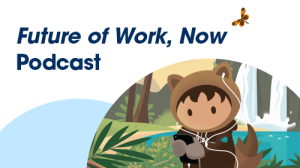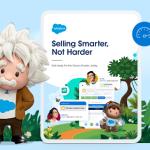As companies become more digital and have more online interactions with customers, they have an explosion of data at their fingertips. A recent study shows that this data can provide companies with a critical advantage.
The study, by Tableau and YouGov, examined the use of data by organisations in Asia Pacific and Japan during the COVID-19 pandemic. It revealed that 82% of data-driven companies reported critical business advantages during the pandemic. It also found that 62% of data-driven companies are optimistic about the future.
So, how can more companies reap these advantages? We examine this topic in season four of our Future of Work, Now podcast, Tech in Hyperspeed. The season is hosted by Jess O’Reilly, Regional Vice President for Salesforce. To kick off the fourth season, she talked to our first guest about how to build a data culture.
Here are highlights of the conversation with Robert Wickham, Vice President Strategy & Growth, Tableau Asia Pacific & Japan:
Why are data companies more optimistic about the future?
The global pandemic has made us feel as though we’ve gone through a portal and come out on the other side, to a world where the laws of physics no longer apply. It’s a little bit like being dropped into the jungle and needing to find a new path. We need new tools to navigate and data acts as our map and compass.
For example, by looking at what employees and customers are telling you — whether through surveys or through the data they’re creating — you can create services that are more relevant to them right now.
Organisations that have a data culture feel more optimistic about how to navigate these uncertain times.
What does having a data culture mean to you?
Data culture can sound like yet another buzz word, but within a data culture there are several elements that lead people to value and rely on data to make decisions. One of these is data literacy. Can you read and understand your data? Can you ask the right questions and become a data detective?
When we talk to customers about creating a data culture, we encourage them to think about three fundamental pieces of the puzzle. The first is that you’ve got to build trust. The second is that you’ve got to cultivate talent. The third is you’ve got to drive commitment from the top down.
If we explore those pieces in more detail, trust has a couple of different facets. First, you need to trust the people within your organisation to be the custodians of the data. So, rather than locking data in silos, you want to create an environment where all employees have access to data and the opportunity to explore it. Secondly, you need to be able to trust your data and know that it is valid. That requires data literacy.
How can you cultivate talent and data literacy?
You need to bring people into your organisation that already have data literacy skills. That means you need to look at your recruiting practices and your job descriptions, and ensure you’re hiring for those skills.
Secondly, you need to create learning pathways for existing employees so that they can learn and develop their skills. We do this at Salesforce through Trailhead and there are some organisations that have set up data academies.
Building data literacy is not something that can be achieved with a “one and done” mindset though. In addition to offering training, companies need to create data communities where people can continue to learn and share.
What does the future of data and analytics look like?
I am excited about a future where everyone is thinking about data and analytics, and making data-driven decisions regardless of their role. I’d also like to see data become as significant and easily available as electricity in the developed world.
Listen to the full podcast for more insights on how to build a data culture and create data-driven customer experiences.
Access the podcast on demand at our podcasts page, Spotify, and iTunes. You can also listen over at the Singapore Community Radio Twitch page, Facebook page, and website.
Tune in at 1:00 p.m. SGT Friday, April 23 to hear from Dr Ayesha Khanna, CEO and Co-Founder of ADDO AI, an artificial intelligence (AI) solutions firm and incubator.
Sign up here for our Salesforce Asia Blog newsletter to get monthly updates on the latest Salesforce stories.

























